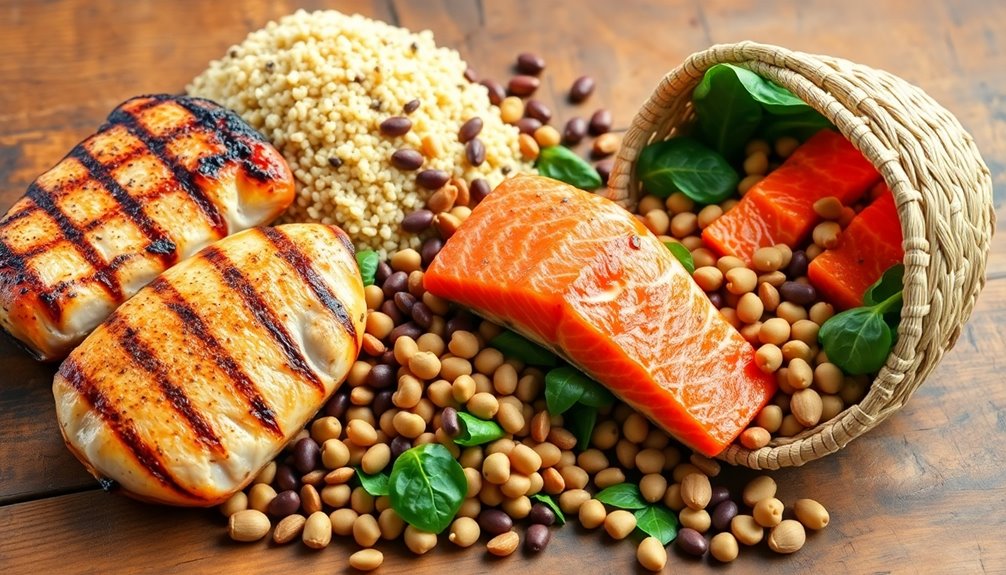Protein is essential for boosting your metabolism and overall health. It increases your metabolic rate by 15-30%, which means you burn more calories during digestion compared to fats and carbs. By supporting muscle mass, protein helps maintain a higher metabolic rate, especially during weight loss. Additionally, it helps control your appetite, keeping you full and reducing snacking. Incorporating lean meats, plant-based proteins, and timing your protein intake can optimize these benefits. Exploring diverse protein sources and their effects can further enhance your metabolic health, and there's much more to discover about maximizing these benefits.
Key Takeaways
- Protein consumption increases metabolic rate by 15-30%, resulting in more calories burned during digestion compared to fats and carbohydrates.
- High-protein diets enhance feelings of fullness, which can lead to reduced overall calorie intake and less snacking.
- Maintaining muscle mass through adequate protein intake prevents metabolic slowdown during weight loss efforts.
- Diverse protein sources, including lean meats and plant-based options, contribute essential nutrients that support optimal metabolic functions.
- Consuming protein regularly throughout the day keeps metabolism active and helps manage hunger effectively.
Understanding Metabolism Basics

Metabolism is a complex process that can be broken down into two main components: catabolism and anabolism. In simple terms, catabolism refers to the breakdown of macronutrients—carbohydrates, fats, and proteins—into smaller units, releasing energy in the process. This energy fuels everything you do, from daily activities to intricate bodily functions.
Anabolism, on the other hand, involves the synthesis of new compounds, using energy to build muscles, tissues, and other essential components your body needs to thrive.
Understanding how these processes work together helps you appreciate the importance of macronutrient breakdown in your diet. When you consume food, your body doesn't just use it for immediate energy; it also stores excess energy for later use. This balance between energy expenditure and energy intake plays a fundamental role in maintaining your metabolic health. If you're looking to optimize your metabolism, focusing on nutrient-rich foods can make a difference.
For instance, protein plays a crucial role in both catabolism and anabolism. It helps repair tissues and build muscle, which in turn can increase your resting metabolic rate. Additionally, research has shown that a well-structured diet program can promote weight loss, enhancing your overall metabolic function.
When you understand the interplay of these components, you'll feel more empowered to make choices that support your overall well-being. So, whether you're trying to lose weight or simply want to feel more energized, acknowledging the basics of metabolism can be your first step toward achieving your goals and feeling like you belong in a community of health-conscious individuals.
Protein's Thermogenic Effect

When it comes to fueling your body, the type of macronutrients you consume can have a significant impact on your metabolic rate. Among these, protein stands out for its unique thermogenic effect. This means that when you eat protein, your body burns more calories during digestion, absorption, and metabolism compared to fats and carbohydrates. This process not only boosts your energy expenditure but also plays an important role in protein synthesis—the process where your body builds and repairs tissues.
Research shows that consuming protein can increase your metabolic rate by 15-30%, while fats and carbs typically only raise it by 5-10%. Imagine the possibilities—by simply adjusting your diet to include more protein-rich foods, you can enhance your metabolism and potentially improve weight management. This is particularly beneficial for those in search of a supportive community focused on healthy living.
Moreover, protein's thermogenic effect means that your body continues to burn calories even after you've finished eating. This sustained energy expenditure helps maintain a healthy weight and can make a real difference in your overall health journey. Additionally, incorporating plant-based protein sources into your diet can further amplify these benefits.
Role of Muscle Mass

Building and maintaining muscle mass plays a vital role in optimizing your metabolism. When you increase your muscle mass, you boost your metabolic rate, which means your body burns more calories even at rest. This is essential for anyone looking to manage their weight or improve their overall health. Research shows that muscle tissue requires more energy to maintain than fat tissue, making muscle maintenance an integral component of an efficient metabolism.
By focusing on strength training and incorporating sufficient protein into your diet, you can enhance your muscle mass. As you engage in resistance exercises, you not only build muscle but also stimulate the production of hormones like testosterone and growth hormone, which further support metabolic processes. It's a cycle of benefits that reinforces your dedication to health and fitness. Additionally, utilizing tools like mini bands can provide effective resistance training that enhances muscle toning and overall strength.
Moreover, as you increase your metabolic rate through muscle growth, you'll notice improvements in energy levels and physical performance. This can create a sense of achievement and belonging within fitness communities, as you share your progress and challenges with others who've similar goals.
In this journey, remember that consistency is key. Prioritize regular strength training sessions and maintain a balanced diet rich in protein to support your muscle maintenance efforts. By doing so, you're not just shaping your body; you're also creating a sustainable lifestyle that promotes a healthy metabolism and fosters a strong sense of community.
Appetite Regulation and Protein

Protein plays a crucial role in appetite regulation, influencing how full you feel and when you reach for your next meal. When you consume protein, it increases your levels of hormones like GLP-1 and PYY, which promote feelings of satiety. This means you're less likely to experience those pesky protein cravings that can derail your healthy eating goals.
Here's how protein contributes to your overall appetite management:
- Promotes fullness: High-protein meals can keep you satisfied longer than carbs or fats.
- Reduces snacking: When you feel full, you're less likely to reach for unhealthy snacks between meals.
- Stabilizes blood sugar: Protein helps maintain balanced blood sugar levels, preventing those energy crashes that trigger cravings.
- Supports muscle maintenance: More muscle means a higher metabolism, which can help regulate your appetite effectively.
- Enhances meal satisfaction: Enjoying protein-rich foods can make meals more enjoyable, fostering a positive relationship with food.
Incorporating sufficient protein into your meals not only helps with protein satiety but also empowers you to make better choices throughout the day. You're less likely to be tempted by high-calorie snacks, allowing you to feel in control of your eating habits. Additionally, a research-based approach to managing your diet can enhance the effectiveness of your appetite regulation efforts. By prioritizing protein, you're creating a foundation for a healthier lifestyle that ultimately fosters a sense of belonging within your food journey, aligning with your goals and aspirations.
Protein Sources for Diet

A variety of protein sources can elevate your diet and contribute considerably to your overall health. When you think about protein, you might picture lean meats like chicken, turkey, or fish. These options are fantastic because they're low in saturated fats and packed with essential nutrients. Including lean meats into your meals can help you feel satisfied while supporting muscle growth and metabolism.
But don't overlook plant-based proteins! They're not only diverse and delicious but also provide a wealth of health benefits. Options like lentils, chickpeas, quinoa, and tofu are excellent choices. These foods are rich in fiber, vitamins, and minerals, making them perfect companions for your health journey. Plus, they can help lower cholesterol levels and reduce the risk of chronic diseases. Additionally, incorporating whole food sources of protein into your diet can enhance your energy levels and aid in weight loss.
Combining both lean meats and plant-based proteins in your diet can create a well-rounded nutritional profile. For instance, try adding beans to your salads or having a side of roasted vegetables with grilled chicken. This combination not only enhances flavor but also guarantees you're getting a range of amino acids necessary for your body.
Incorporating diverse protein sources fosters a sense of belonging within the community of health-conscious eaters. Whether you're a devoted meat-eater or exploring vegetarian options, embracing these protein sources can lead to a fulfilling and nourishing diet. So go ahead, experiment with different combinations, and enjoy the journey toward better health!
Timing Protein Intake

Timing your protein intake can significantly impact your metabolism and muscle recovery. When you strategically consume protein, you help optimize the digestion process and enhance your body's ability to use that protein effectively. This isn't just about how much protein you eat; it's also about when you eat it. Research shows that distributing your protein intake evenly throughout the day supports muscle synthesis and boosts metabolic rate.
Consider these key points about protein timing:
- Post-Workout Window: Consuming protein within 30 minutes after exercise can noticeably enhance recovery and muscle repair.
- Frequent Meals: Eating protein-rich foods every few hours keeps your metabolism revved up and helps manage hunger.
- Pre-Bedtime Protein: A small protein-rich snack before bed can aid overnight muscle recovery and slow digestion, providing a steady supply of amino acids.
- Balanced Breakfast: Starting your day with protein helps stabilize blood sugar levels and reduces cravings throughout the day.
- Pre-Workout Fuel: Including protein before workouts can provide energy and enhance performance.
Additionally, maintaining a healthy alcohol-free lifestyle can further improve your metabolism and overall well-being by reducing the strain on your body and supporting better nutrient absorption.
Protein and Weight Loss Strategies

Incorporating protein into your weight loss strategy can be a game changer for achieving your goals. Not only does protein consumption support muscle retention during a calorie deficit, but it also enhances feelings of fullness, making it easier to manage your weight effectively. Research indicates that a higher protein intake can boost your metabolism, allowing you to burn more calories throughout the day. Additionally, focusing on delicious, easy-to-make recipes can help you enjoy a variety of protein-rich meals without feeling deprived.
To help you understand how to incorporate protein into your meals, here's a simple breakdown of protein sources, their benefits, and serving sizes:
| Protein Source | Benefits | Serving Size |
|---|---|---|
| Chicken Breast | Lean, high in protein | 3 oz |
| Greek Yogurt | Probiotics and calcium | 1 cup |
| Lentils | High fiber, plant-based | 1 cup cooked |
Focusing on protein-rich foods not only aids in weight management but also supports your overall health. You can feel satisfied while enjoying a variety of meals. Consider adding these sources to your daily diet and experiment with different recipes to keep your meals exciting.
Incorporating protein into your weight loss plan fosters a sense of community as you share recipes and tips with friends or family. Remember, you're not alone in this journey. With the right strategies and support, you can achieve your weight loss goals while feeling great.
Frequently Asked Questions
Can Protein Help With Energy Levels Throughout the Day?
Yes, protein can definitely help with your energy levels throughout the day. Incorporating protein snacks between meals can keep your energy steady, preventing those afternoon slumps. Timing your meals is also essential; eating protein-rich foods at regular intervals can sustain your energy.
What Are the Risks of Excessive Protein Consumption?
Excessive protein consumption can lead to several health risks you should be mindful of.
One major concern is protein toxicity, which can strain your kidneys and liver over time.
Additionally, you might experience digestive issues like bloating, gas, or constipation if your body can't process the excess protein efficiently.
It's crucial to balance your intake, ensuring you're meeting your body's needs without overdoing it, so you can enjoy a healthy, active lifestyle.
How Does Protein Affect Mood and Mental Health?
Think of protein as a sturdy bridge connecting your body and mind. It plays an essential role in cognition, affecting your mood and mental health. Consuming adequate protein can enhance mood by stabilizing blood sugar and increasing neurotransmitter production, which helps you feel balanced and focused.
When you prioritize protein, you're not just fueling your body; you're also nourishing your mind, fostering a sense of belonging in your own mental landscape.
Are There Any Vegan Protein Sources That Boost Metabolism?
There are several plant-based options that can boost your metabolism.
Foods like lentils, chickpeas, and quinoa provide essential amino acids while also offering metabolic benefits. Incorporating these vegan proteins into your meals can enhance your energy levels and support weight management.
Don't forget about nuts and seeds, too; they're packed with healthy fats and protein.
Embracing these options not only nourishes your body but also aligns with a vibrant, sustainable lifestyle.
How Does Aging Impact Protein Metabolism in the Body?
Aging impacts protein metabolism like a slow leak in a tire; you hardly notice it until you're running low. As you age, protein synthesis declines, making muscle retention more challenging. This means your body struggles to repair and build muscle efficiently.
To combat this, prioritize higher protein intake and resistance training. Staying active and mindful about your nutrition can help maintain your strength and support overall health as you gracefully age.
Conclusion
Incorporating protein into your diet can be a game-changer for your metabolism. It's not just about building muscle; protein ignites your body's calorie-burning furnace, regulates appetite, and supports effective weight loss strategies. Think of protein as the spark that fuels your metabolic engine, helping you achieve your health goals. By understanding its role and timing your intake, you can harness the full benefits of protein to transform your metabolism and overall well-being.



